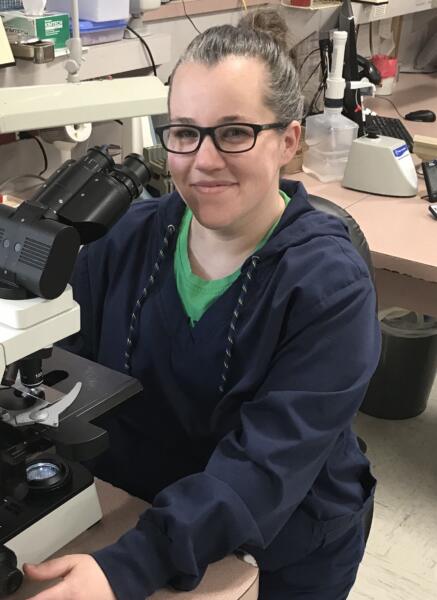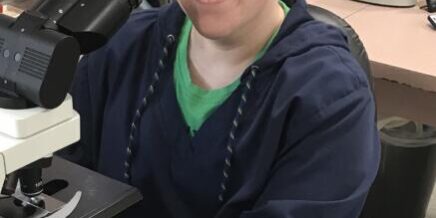Maddie Josephs, MS, MT(ASCP), ASCLS Region I Director
 |
| Catie recently completed the MLT program at the Community College of Rhode Island, which changed her life. |
As an educator, I have an opportunity to meet a wide variety of students, from all walks of life, at various stages in their lives and many for whom life has had its challenges. I am always in awe of the student who works full or part time, cares for a family, and who further dedicates an abundance of time to his or her program of studies. I have the utmost respect for the student who prioritizes the many responsibilities of life and who always seems to make sure education is at the forefront. I can remember my college days and my subsequent year of clinical internship. The only responsibility I had was my program of studies … I was very lucky.
One student whose story really had an impact on me—and there have been so many—completed the MLT program last May. She passed the Board of Certification (BOC) exam and obtained employment immediately after completion of the program. I sat down with her to learn more about her journey to becoming a medical laboratory technician. When I asked to meet with her, she told me that she tells everyone how the MLT program changed her life. She also works hard to educate family, friends, and other healthcare professionals about this profession. Here is Catie’s story.
Maddie: What were you doing prior to entering the MLT program?
Catie: I was a phlebotomist. I went through the phlebotomy program because I needed a profession that provided better benefits. As a single mom of two children, it was important to find a job that I could rely on to provide for us. I always wanted to do something in the medical field, and this was a quicker path to where I wanted to be. My responsibilities eventually included becoming the reference lab coordinator, where I processed the send-out tests as well as planting in the microbiology lab.
Maddie: What made you decide to further your education?
Catie: The plan was always to further my education, but as I said, I needed a job with benefits. I really didn’t know what medical laboratory science was. While I was completing the clinical rotation component of my phlebotomy program, I met a student in the MLT program, also completing her clinical rotation at the same hospital. She is the one who told me that I needed to look into this field because she saw my interest and perhaps, she realized that I was capable of more. After securing a job as a phlebotomist and getting everything settled, I applied to the MLT program.
Maddie: What impact has the program had on you, your life, your family, etc.?
Catie: I know this sounds cliché, but it totally changed my life. I can support myself and my two children. I was so lucky to find a first shift position in microbiology, but I have the opportunity to work in the core lab as well, and my laboratory director wants me to also spend some time in blood bank. I feel so fortunate to have the support of my supervisors and my director. It is so gratifying to come into work and know that I make a difference.
Maddie: What gives you the most satisfaction as a medical laboratory technician?
Catie: I love that I am physically making a difference in patient care. Of course, no one really knows what we do and how important it is, including my family, so I love educating the public. I tell everyone what I do and what a difference this profession has made in my life. I sometimes work at an urgent care center with a physician’s assistant as well as a nurse practitioner. When I help to explain a test result, or when I explain the results of an antimicrobial susceptibility test, their minds are blown when they realize what I do and how much I know about laboratory diagnostics.
The other day, I was dropping my son off at his before-school program and his little friends asked him if I was a nurse because I was wearing scrubs. He said no, that I was a scientist. Well, that explanation was not good enough for everyone, and they continued to insist that his mom was a nurse. When I went to pick him up, the teacher explained that there was a lot of discussion related to my career and she asked that I explain to the students exactly what I do. I proceeded to tell them I was a laboratory scientist and that when the doctor ordered a blood test or a culture swab, that I was the one that tested that to let the doctor know what is wrong and what is making them sick.
Maddie: I love this story … it is never too early to start recruiting!
The MLT program was very rigorous, and you had so many responsibilities while you were going through the program. Given the choice, and knowing what you know now about the rigors of this education, would you go through it again?
Catie: Most definitely, in a heartbeat! I do wish I knew about the program before going through the phlebotomy program, but in the end, being a phlebotomist really helped. Starting as a phlebotomist and then becoming a tech is a great sequence. You understand all aspects of lab, from specimen collection on, including the effects of improper collection and handling, contamination, how to process reference lab tests, and so much more.
An Example for Us All
Catie became a member of ASCLS during her first year in the program. In addition to all her outside responsibilities, she was elected president of the MLT Club and impressively led her fellow students through several on- and off-campus fundraisers to benefit a scholarship to be awarded to a student in memory of an MLT program alumna.
Catie sacrificed a lot to complete her program of studies, and I’m sure it would have been so much easier for her to just continue in her phlebotomy career, but she persevered. Of course, there are hundreds, if not thousands, of stories just like Catie’s. And of course, many of us can relate to this story. However, what Catie is doing outside of her duties—educating the public, from a kindergartner to a physician’s assistant—is what we ALL need to be doing. We may just receive the professional recognition that we all strive for and deserve.
Maddie Josephs is professor/department chair at the Community College of Rhode Island in Lincoln, Rhode Island.
